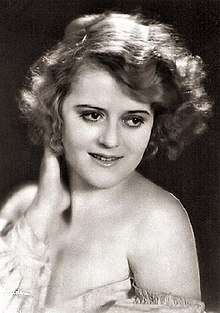Maria Matray
Maria Matray (14 July 1907 – 30 October 1993) was a German screenwriter and film actress. Matray became a star of late Weimar cinema. Following the Nazi takeover in 1933, Matray, who was Jewish, went into exile – initially in France and Britain before moving to the United States. She developed a new career as a choreographer and writer. She later returned to Germany after the Second World War, where she died in 1993.[1]
Maria Matray | |
|---|---|
 | |
| Born | 14 July 1907 |
| Died | 30 October 1993 (aged 86) Munich, Germany |
| Other names | Maria Stern; Maria Solveg |
| Occupation | Film actor, screenwriter, choreographer |
| Years active | 1923–1993 |
Selected filmography
Actress
- The Master of Nuremberg (1927)
- Linden Lady on the Rhine (1927)
- Inherited Passions (1929)
- The Son of the White Mountain (1930)
- Never Trust a Woman (1930)
- Retreat on the Rhine (1930)
- Elisabeth of Austria (1931)
- Road to Rio (1931)
- The Ringer (1932)
- Distorting at the Resort (1932)
- A Man with Heart (1933)
Screenwriter
- Murder in the Music Hall (dir. John English, 1946)
- Invitation Playhouse: Mind Over Murder: The Last Act (dir. William Asher, 1952, TV series episode)
- Der König mit dem Regenschirm (dir. Ernst Matray, 1954, TV film) — based on an operetta by Ralph Benatzky
- Abschiedsvorstellung (dir. Ernst Matray, 1955, TV film)
- My Father, the Actor (dir. Robert Siodmak, 1956)
- The Night of the Storm (dir. Falk Harnack, 1957) — based on a novel by Klaus Hellmer
- Und abends in die Scala (dir. Erik Ode, 1958)
- Frau im besten Mannesalter (dir. Axel von Ambesser, 1959)
- The Night Before the Premiere (dir. Georg Jacoby, 1959)
- Die schöne Lügnerin (dir. Axel von Ambesser, 1959) — based on a play by Ernst Nebhut and Just Scheu
- Waldhausstraße 20 (dir. John Olden, 1960, TV film)
- The Happy Years of the Thorwalds (dir. Wolfgang Staudte, John Olden, 1962) — based on Time and the Conways by J. B. Priestley
- Das Kriminalmuseum (1963–1968, TV series, 4 episodes)
- Das Kriminalgericht: Der Fall Krantz (dir. Georg Tressler, 1964, TV series episode)
- Der Prozeß Carl von O. (dir. John Olden, 1964, TV film) — (docudrama about the Weltbühne-Prozess)
- Die fünfte Kolonne (1964–1965, TV series, 3 episodes)
- Ein langer Tag (dir. Lothar Kompatzki, 1964, TV film)
- Der Fall Harry Domela (dir. Wolfgang Schleif, 1965, TV film) — (docudrama about Harry Domela)
- Klaus Fuchs: Geschichte eines Atomverrats (dir. Ludwig Cremer, 1965, TV film) — (docudrama about Klaus Fuchs)
- Bernhard Lichtenberg (dir. Peter Beauvais, 1965, TV film) — (docudrama about Bernhard Lichtenberg)
- Oberst Wennerström (dir. Helmut Ashley, 1965, TV film) — (docudrama about Stig Wennerström)
- Der Mann, der sich Abel nannte (dir. Ludwig Cremer, 1966, TV film) — (docudrama about Rudolf Abel)
- Standgericht (dir. Rolf Busch, 1966, TV film)
- Der schwarze Freitag (dir. August Everding, 1966, TV film) — (docudrama about the Wall Street Crash of 1929)
- Der Fall Lothar Malskat (dir. Günter Meincke, 1966, TV film) — (docudrama about Lothar Malskat)
- Das Millionending (dir. Helmut Ashley, 1966, TV film) — based on a story by Henry Kolarz
- Der Panamaskandal (dir. Paul Verhoeven, 1967, TV film) — (docudrama about the Panama scandals)
- Affäre Dreyfus (dir. Franz Josef Wild, 1968, TV film) — (docudrama about the Dreyfus affair)
- Der Senator (dir. Günter Gräwert, 1968, TV film) — (docudrama about Joseph McCarthy)
- Hotel Royal (dir. Wolfgang Becker, 1969, TV film)
- Maximilian von Mexiko (dir. Günter Gräwert, 1970, TV film) — (docudrama about the Second French intervention in Mexico)
- Millionen nach Maß (dir. Erich Neureuther, 1970, TV film)
- Der Hitler/Ludendorff-Prozeß (dir. Paul Verhoeven, 1971, TV film) — (docudrama about the trial after the Beer Hall Putsch 1923)
- Manolescu – Die fast wahre Biographie eines Gauners (dir. Hans Quest, 1972, TV film) — (docudrama about Georges Manolescu
- Doppelspiel in Paris (dir. Wolfgang Glück, 1972, TV film) — (docudrama about Mathilde Carré)
- Sonderdezernat K1 (1972–1975, TV series, 12 episodes)
- Agent aus der Retorte (dir. Wolfgang Glück, 1972, TV film) — (docudrama about Operation Mincemeat)
- Eine geschiedene Frau: Reise nach Stockholm (dir. Claus Peter Witt, 1974, TV series episode)
- Wie starb Dag Hammerskjöld? (dir. Oswald Döpke, 1975, TV film) — (docudrama about the 1961 Ndola United Nations DC-6 crash)
- Als wär's ein Stück von mir (dir. August Everding, 1976, TV film) — based on the autobiography of Carl Zuckmayer
- Diener und andere Herren (dir. Wolfgang Glück, 1978, anthology film, TV film) — based on short stories by O. Henry, P. G. Wodehouse and W. Somerset Maugham
- The Old Fox: Der schöne Alex (dir. Theodor Grädler, 1978, TV series episode)
- Auf Schusters Rappen (dir. Manfred Seide, 1981, TV film)
- Sun, Wine and Hard Nuts (1981, TV series, 2 episodes)
- Ein Winter auf Mallorca (dir. Imo Moszkowicz, 1982, TV film)
- Gauner im Paradies (dir. Thomas Fantl, 1985, TV film)
- Im Schatten von Gestern (dir. Thomas Hartwig, 1985, TV film) — screenplay with Nathaniel Gutman
- Wie das Leben so spielt (dir. Hermann Leitner, 1986, TV film)
- Jungbrunnen (dir. Dušan Rapoš, 1992, TV film)
gollark: "Planned to" is dubious, considering.
gollark: And I reserve the right to arbitrarily complain about all things ever.
gollark: Well, I'm not.
gollark: Wow, your threats totally excuse more threats.
gollark: I disagree utterly. And they didn't refuse to in any case.
References
- Weniger p.466-68
Bibliography
- Weniger, Kay. 'Es wird im Leben dir mehr genommen als gegeben ...' Lexikon der aus Deutschland und Österreich emigrierten Filmschaffenden 1933 bis 1945: Eine Gesamtübersicht. ACABUS Verlag, 2011.
This article is issued from Wikipedia. The text is licensed under Creative Commons - Attribution - Sharealike. Additional terms may apply for the media files.